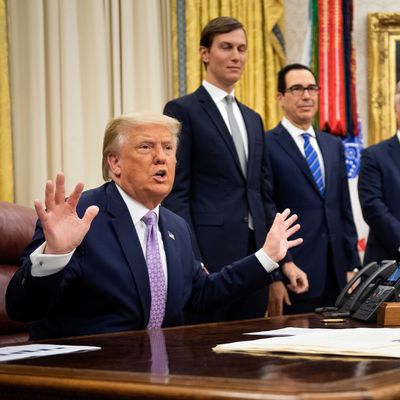
The United Arab Emirates established full diplomatic ties with Israel Thursday, becoming the first Gulf Arab nation to normalize relations with Jerusalem.
Since its founding in 1971, the UAE had withheld recognition from Israel due to its occupation of Palestinian territories. Over the ensuing decades, the popularity of the Palestinian cause among UAE residents, the political utility of anti-Zionism to the nation’s authoritarian regime, and a sense of solidarity with the largely Arab Palestinian people kept such diplomatic recognition at bay.
But in 2020, the Emirati leadership has more use for warm relations with Israel than they do for the Palestinian cause. The UAE and Israel are both wealthy nations with a shared interest in countering Iranian regional influence. The rising generation of Gulf royals have less personal attachment to Palestinian nationhood than many of their forebears. And Abu Dhabi Crown Prince Mohammed bin Zayed Al Nahyan (MBZ) feels secure enough in his power to flout domestic public opinion on a matter of foreign policy.
For these reasons, the Trump administration was able to successfully broker an agreement between Israel and the UAE normalizing relations between the two nations and establishing a series of bilateral deals on security, technology, energy, investment, and tourism. The two countries will establish reciprocal embassies and enable direct flights between their borders.
The UAE’s price for providing Israel with this recognition — and providing its embattled leader, Benjamin Netanyahu, with a political victory — was markedly cheap. The Israeli government did not pledge to recognize Palestinian sovereignty over the West Bank. It did not promise to halt or even slow the expansion of Israeli settlements in the occupied territories. Rather, Israel agreed that it will not illegally annex its settlements in the West Bank, in wanton defiance of international law and opinion — for a little while.
“As a result of this diplomatic breakthrough and at the request of President Trump with the support of the United Arab Emirates, Israel will suspend declaring sovereignty over areas outlined in the President’s Vision for Peace and focus its efforts now on expanding ties with other countries in the Arab and Muslim world,” the White House said in a statement Thursday, which it described as as a joint declaration of Israel, the UAE, and the United States.
Note: Israel did not commit to abandoning its claims of sovereignty over the Palestinian lands that the Trump administration unilaterally awarded it. It only agreed to “suspend” annexation as it seeks to normalize relations with other Gulf States (further marginalizing Palestinians in the process).
For Netanyahu, the agreement offers a positive headline at a moment when a pandemic-induced economic crisis is eroding his popularity and threatening to fracture his fragile coalition government. By postponing annexation, the Israeli prime minister does risk angering his party’s hardline settler contingent. But among the broader Israeli public, annexation is not a high priority.
For the UAE, the deal “further burnishes its international campaign to be seen as a beacon of tolerance in the Middle East despite being governed by autocratic rulers,” in the AP’s analysis.
For Trump, the agreement bolsters a relatively scant foreign-policy record ahead of the 2020 election (although it is hard to imagine a peace agreement between two small Middle Eastern countries having much salience to the American electorate at a time of mass death and unemployment).
As for the Palestinians, the deal leaves non-Israeli inhabitants of the West Bank subject to the military rule of an occupying power and 2 million Gazans living under an Israeli blockade on a small strip of land that has no sustainable source of drinking water and which the United Nations has deemed “uninhabitable.”






























